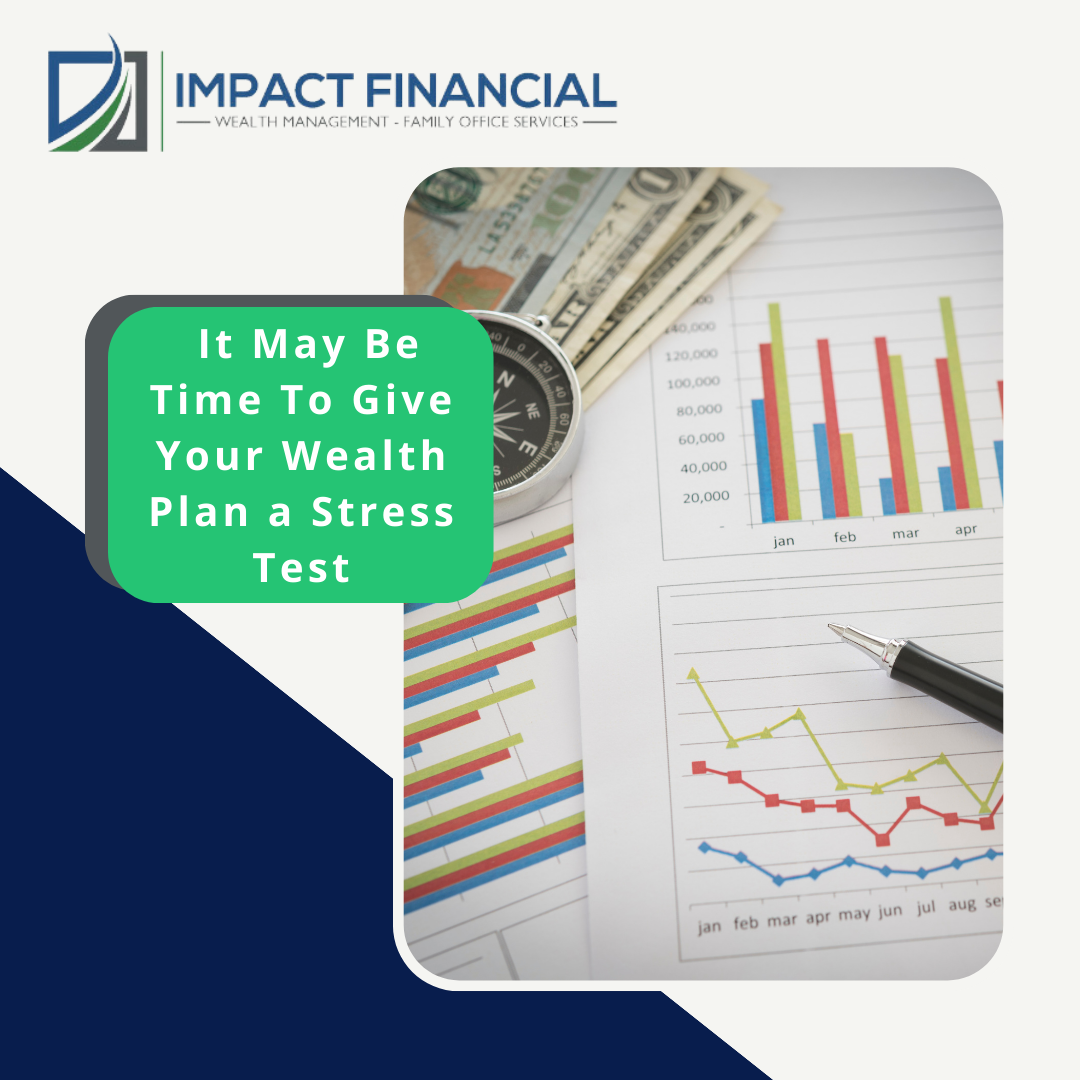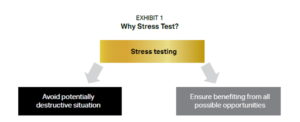Key Takeaways:
- Stress testing can help you see if your strategies are still likely to do what you expect them to do.
- When your personal situation changes—or there are big shifts in the world at large—stress testing may be a good move.
- Conduct stress tests with professionals who are technically proficient and who know your goals extremely well.
One of the best plans to take from the financial playbook of the Super Rich—those with a net worth of $500 million or more—is to work with professionals to help manage your financial and lifestyle concerns.
But, as the Super Rich know, you can’t stop there.
Remember when former-President Reagan urged a “trust but verify” approach regarding a nuclear missile treaty with the Soviet Union in the 1980s? Well, we also need to regularly assess whether the financial advice we get—and the financial solutions we rely on—are truly up to snuff.
The Super Rich regularly take this step, and so should you. One reason: Despite your best efforts, it’s possible to mistakenly end up working with financial professionals who want to do a great job, but who just don’t have the skills or resources to make it happen for you. Worse, you might cross paths with someone who offers highly aggressive solutions that push the envelope of legitimacy. You may even potentially encounter a predatory “professional” who wants to do little more than steal your assets.
Another reason is that as your circumstances change, or the world around you changes, the solutions you have in place may no longer be optimal for your needs. “Life happens,” as they say—and strategies that were ideal for you a decade ago might be in need of revision.
That’s where a technique known as stress testing can make a big difference.
From piecemeal to comprehensive
A stress test can help you see whether the wealth management solutions you are using are not only in alignment with your goals and objectives but also appropriately state of the art. Stress testing is a systematic way to determine how your wealth management solutions are likely to hold up under different scenarios—and ultimately deliver the results you expect.
There are two main reasons why the Super Rich regularly conduct stress tests (see Exhibit 1):
- To avoid potentially destructive economic and legal situations
- To ensure they are benefiting from all possible opportunities
One big reason why your wealth planning efforts may be in need of fine-tuning (or possibly more) is that far too many investors—including both the Super Rich and the “merely affluent”—do what we call piecemeal planning. That means they address one concern without considering their larger situation. Then maybe two years later, they address another consider—again without factoring in other aspects of their financial lives.
Often, the result is there’s little to no coordination among the various professionals helping them, and little to no coordination among the various financial solutions or strategies they implement. Because of the fragmented and disjointed nature of how a plan may have been developed, it isn’t set up for potential success nearly as well as it could be.
Stress testing allows individuals and families to look at their situation holistically to see whether their goals and objectives are being addressed and they are using the most appropriate, cost-effective and up-to-date strategies and solutions.
Not surprisingly, we see that stress testing is becoming the norm among the Super Rich—especially those with truly significant wealth that presents deep complexities in managing it. But it’s also an increasingly popular approach among “merely wealthy” investors who want to boost the probability that they’re using the best wealth management solutions for their particular situations. The overall trend of democratization in financial services—which has brought once-exclusive solutions to more investors—is also bringing stress testing to a larger audience.
When is the time right?
When is the right time to consider a stress test on your finances? Bottom line: The right time is whenever you are not 100 percent sure you are using the best available wealth management solutions—and, as a result, you are concerned that:
- There may be errors in your wealth plan.
- There may be opportunities to improve your situation that are currently missing from your plan.
By stress testing your plan or specific aspects of it, you can potentially confirm that you are on target—or identify corrections that will put you on the right track toward the end results you most want to achieve.
Example: Many wealthy families do not have a large enough umbrella policy, which can set the stage for a very costly and emotionally draining outcome. This is an issue that is easy and usually inexpensive to correct. Similarly, we see that business owners who do stress tests commonly find they have life insurance that is poorly structured and therefore isn’t set up to mitigate risk as well as they’d assumed.
Getting the most from a stress test
If you want to stress test your portfolio, how can you be confident it’s being done thoroughly by a high-quality professional? We suggest the following action steps.
Step #1: Seek out professionals who can clearly explain the process of stress testing and its value.
It’s a good sign when a financial professional can explain stress testing—the value it can bring and the reasons for doing a stress test in the first place.
For starters, stress testing is not about being sold services or products, nor is it going to always result in making any changes to the current wealth plan.
Instead, think of stress testing more like an annual physical checkup. You may not have any medical concerns going into the appointment, but you show up because you want to ensure that any unidentified or hidden problems are uncovered. That way, you can take steps before the problems become serious.
Stress testing can also be, and often is, done when people don’t know if they have the best wealth management solutions for their situation. If you feel confused or uncertain about the wealth management solutions you are employing—which might occur after a big life change, for instance—stress testing may be a good idea.
Recommendation: The professional who will do the stress testing should be able to explain the process as well as all the ramifications that are likely to occur. A nice bonus is if the professional can share with you examples of stress testing and how it benefited other families.
Step #2: Work with professionals who are focused on the human element.
Stress testing isn’t meant to coldly evaluate a wealth strategy against some benchmark. Rather, it’s designed to help you see if that strategy is still best suited for you based on your needs, wants and preferences.
In short, a stress test has to take into account important personal and even emotional traits to be effective. This human element is vital in ensuring you are getting the desired wealth management results—and that those results are within the parameters you establish.
That means the professional who does the stress test must have a deep understanding of you—including your goals and values as a person, not just your net worth. Such an understanding takes some time to develop and often relies on individuals sharing their concerns as well as their hopes and wishes. The professionals who employ systematic processes to develop insights into their clients and are able to “connect the dots” based on these insights will be best able to consistently create significant advantages for their clients through stress testing.
Important: Many times, high-quality stress testing does not lead to any meaningful changes in a family’s wealth plan. While some minor refinements and tweaking are common, major changes usually aren’t needed. That said, when errors and oversights are uncovered, they can be quite substantial.
Recommendation: Make sure the professional stress testing your wealth management solutions is truly client-centered—that is, focused on you as a person.
Step #3: Work with professionals who are highly technically proficient.
Although the human element takes center stage, it won’t do much good if the person doing the stress test can’t expertly evaluate your current wealth solutions or ones that potentially could be a good fit for you.
A highly proficient professional can evaluate the most sophisticated and complex wealth management solutions to see if they work, are working as expected, and are not in any way skirting laws or regulations. He or she also will be knowledgeable about alternative strategies and products, and be able to bring in specialists if needed to evaluate current strategies and potential alternatives that may be superior. Being able to construct side-by-side comparisons and looking at all qualities of a wealth management solution (including efficacy and cost-effectiveness) are characteristics of a highly technically proficient professional.
Recommendation: Fundamentally, the technical proficiency of the professional (and his or her team of specialists) should be exceptional. He or she has to be able to evaluate even the most arcane wealth management solutions as well as determine if there are better possibilities that would produce comparable outcomes.
Next step: Let’s discuss your wealth plan and solutions to ensure they are set up to accomplish your goals.
LPL Tracking#490989



